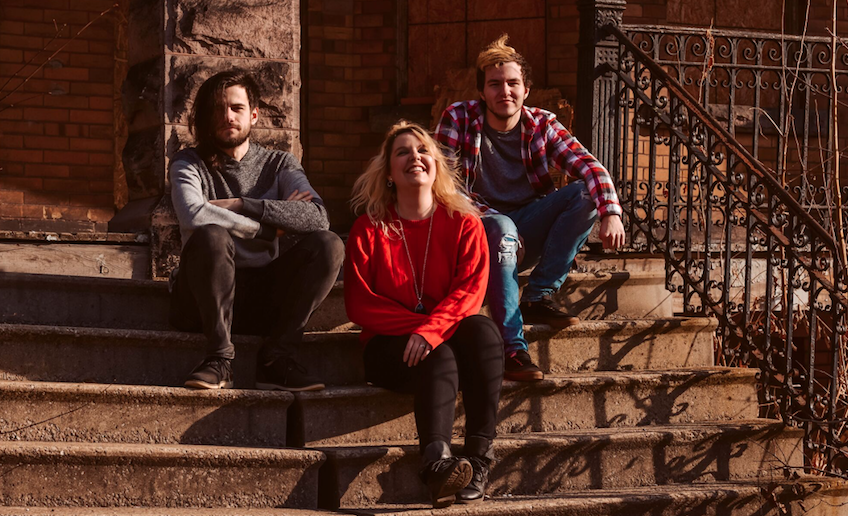Black Wolf and the Thief keep it personal, original

By GUY D’ASTOLFO
YOUNGSTOWN
After three years of playing together, Black Wolf and the Thief has suddenly gained a lot of momentum.
The band released its debut CD, “The Pioneer,” in February, and will play its highest-profile gig to date on Saturday, when it takes the stage at 5:30 p.m. at The Federal as part of the Federal Frenzy festival in downtown Youngstown.
The Warren-based trio consists of the husband-wife team of Clay and Carolyn Colley (keyboards and vocals, respectively), who are the songwriters, and Brian Messina on drums. Clay usually writes the melodies, while Carolyn is the lyricist.
The BWT setlist is usually a mix of originals and covers that the act definitely makes its own.
There is no guitar and no bass, which partially accounts for the band’s unique jazzy-pop sound. Carolyn’s intriguing voice is the other part of the BWT equation.
Clay and Carolyn answered a few questions about their music in this exchange.
Q. The lyrics on your debut album are autobiographical, and some songs delve into personal family history. Talk about the inspiration for the songs.
CAROLYN: “The Pioneer” was inspired by a specific feeling I had at the beginning of a relationship, that I think we’ve all felt: the hope that this will become something and the wariness that it won’t. While the music of the song and the lyrics seem happy and hopeful, this specific relationship turned out be the second option. “Ferris Wheel” and “Low Tide” were inspired by the same relationship, so once you listen to the whole album, you can guess how that worked out.
As for “Juan Dias” and “Love Song for Evelyn” – I always wanted to write a song in honor of my grandpa and as I was writing it, it kind of became more of an ode to my grandma and grandpa’s story together. My grandpa ... often told the story of the first time he saw my grandma, and the voice you hear in “Juan Dias” is a recording of that story.
CLAY: “College” is a song I wrote for my sister, Della. She spent her senior year of high school in Germany, and when she returned to go to college, she went through a pretty tough transition. I started writing the song to encourage her. I taught college for five years, and it’s just a really hard time for a lot of students. The song is really just about those times of transition that everyone goes through at some point in our lives and feel lost and discouraged.
Q. Sonically, BWT is untraditional, with no guitar or bass. Was this by design or was it organic?
CLAY: BWT originally started as just Carolyn and me, and it was pretty organic. Being just piano and voice, people expected songs that were related to classical or jazz, but both of us were more interested in pop and rock songs so what we were trying to do didn’t translate very well. Because of that, we decided to add a drummer, and the three of us worked so well together that we decided to just keep it to the three of us and not add any other instruments. We often hear from people that they are amazed at how “big” we sound for being such a small band.
Q. Carolyn’s voice is among the best in the area. How did you develop your style?
CAROLYN: As I discovered my passion for singing, I was listening to a lot of new age music and world music. I listened to a lot of Loreena McKennitt and tried to emulate her sound. As I matured as a singer, I became very interested in musical theater and discovered the power in my voice. Six years ago, I had the opportunity to travel the country in the performance group Re-Creation USA. The cast members are all volunteers, and we put on song and dance variety shows for hospitalized veterans. I received unbelievable vocal training from the directors of the group, and with this training and experience, I unlocked the true potential of my voice. Now I feel like my style is a weird marriage of rock, new age and theater.
Q. BWT imprints its distinctive sound upon any cover song, and it’s a good skill to have because you can adapt it to almost any venue. Who are your main influences as performers?
CLAY: Because of our instrumentation, my biggest model for what we do is The Doors. On their live albums, they play in 20-minute chunks, with well-rehearsed transitions between songs that really elevate the experience. That inspired us to focus on our transitions between songs as much as the songs themselves, which I think also shows on the album.
 43
43
